|
|
|
Sort Order |
|
|
|
Items / Page
|
|
|
|
|
|
|
| Srl | Item |
| 1 |
ID:
108080
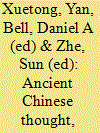

|
|
|
|
|
| Publication |
Princeton, Princeton University Press, 2011.
|
| Description |
viii, 300p.
|
| Standard Number |
9780691148267, hbk
|
|
|
|
|
|
|
|
|
|
|
|
Copies: C:1/I:0,R:0,Q:0
Circulation
| Accession# | Call# | Current Location | Status | Policy | Location |
| 056349 | 327.51/XUE 056349 | Main | On Shelf | General | |
|
|
|
|
| 2 |
ID:
141278
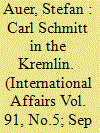

|
|
|
|
|
| Summary/Abstract |
The protracted crisis in Ukraine has exposed fundamental political differences between leaders in western Europe and their counterparts in Russia. The very existence of the European Union was meant to have refuted geopolitics as a useful theoretical lens through which to view power relations in Europe. After all, the European project is based on the idea that boundaries no longer matter and that national sovereignty is obsolete. And yet, geopolitics remains critically important—certainly for Europe's potential enemies, but also for Europe itself. It is poignant that to advance our understanding of this new constellation we are well served to turn to the insights of a classic, if hugely controversial, German political thinker: Carl Schmitt. Schmitt's political philosophy is relevant in three aspects. First, as a source of inspiration—even if only indirectly—for the contemporary Russian political establishment. Second, the behaviour of Putin's Russia, particularly since 2008, can be best understood through some of the key concepts that preoccupied Schmitt: sovereignty, the political and geopolitics. Third, Schmitt's philosophy can serve as a point of departure for reflecting on the possibility of a more robust response by Europe to the Russian intervention in Ukraine. What Europe needs is a more hard-nosed realist approach, which recognizes that Russia's expansionist ambitions can only be constrained by its own readiness and willingness to deploy power both politically and, if necessary, even militarily.
|
|
|
|
|
|
|
|
|
|
|
|
|
|
|
|
| 3 |
ID:
192480


|
|
|
|
|
| Summary/Abstract |
This article postulates that the ideological factor is regaining significance
in today’s multipolar world (summit of democracies, discourse on traditional
values) and promotes the importance of an ideological and value dialogue
between right-wing conservative forces in Russia (as major proponents of
conservatism) and right-wing forces in Europe.
The aim of the study is to substantiate the adherence of Russia’s domestic
and foreign policies to the conservative value agenda, and to analyze the
right-wing political spectrum of contemporary Europe.
The authors conclude that the values shared by the representatives of
European right-wing movements are close to Russia’s value agenda, which
proves the feasibility of establishing diverse strategic interaction with the
proponents of such ideological views in Europe.
|
|
|
|
|
|
|
|
|
|
|
|
|
|
|
|
| 4 |
ID:
105639
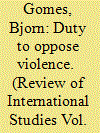

|
|
|
|
|
| Publication |
2011.
|
| Summary/Abstract |
Although the non-intervention rule is often defended as a guarantee of international order, rigid adherence to it cannot be morally justified when governments commit or permit atrocities within their territory. In such cases, intervention is permissible and may even be obligatory. Drawing on the ideas of Rousseau, Kant, and to a lesser extent Hegel, this article examines the grounds of the argument for humanitarian intervention, demonstrating that intervention is in principle not only permissible but obligatory when considered philosophically. The right to intervene can be grounded on common morality, the protection of sovereignty and the coerciveness of justice. The duty to intervene rests on a respect for humanity and the conceptual relationship between rights and duties. Considering these two lines of argument shows that humanitarian intervention can be conceived as a duty that states can be reasonably required to perform.
|
|
|
|
|
|
|
|
|
|
|
|
|
|
|
|
| 5 |
ID:
130787
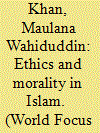

|
|
|
|
|
| Publication |
2014.
|
| Summary/Abstract |
The concept of human values is by its very nature universal. That is why we find uniformity in the teachings on human values in all religions. If there are any differences on this subject, they relate to points of reference, i.e. to religious books, rather than to the human values themselves.
|
|
|
|
|
|
|
|
|
|
|
|
|
|
|
|
| 6 |
ID:
130822
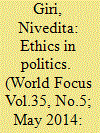

|
|
|
|
|
| Publication |
2014.
|
| Summary/Abstract |
Till recently when India passed through its l6th general Elections, the election Commission of India appealed Indian citizens to select candidates and dump the criminals and the corrupt ones. It also urged the voters to sign a pledge to be ethical while casting their votes in the coming Lok Sabha elections. The Election Commission also appealed the voters to cast their votes without fear or greed, and without keeping caste, religion and creed consideration in mind. The commission's letter also stated that electing a candidate is not merely a citizen's right but his/her responsibility. Ethics and morality have been the hallmark of public life in India since ancient times. Rulers were expected to observe stricter ethical values. Ethics and politics, in other words, were inseparable. This ethical and moral legacy was inherited by its national leaders, who demonstrated a high degree of probity and honesty in public life during the freedom struggle. The early national leaders and political philosophers believed that politics without morality is a thing to be voided. However, in recent years there is a general feeling that all is not well with the Indian political system which is functioning under great strain. It has been noticed and concerns are being expressed over the general decline of values in public life. Recent trends in politics, however, appear to have created an impression as if, the capacity of Indian democratic system to ensure integrity in public life is increasingly going down.
|
|
|
|
|
|
|
|
|
|
|
|
|
|
|
|
| 7 |
ID:
128291
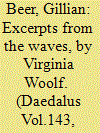

|
|
|
|
|
| Publication |
2014.
|
| Summary/Abstract |
Here is a hall where one pays money and goes in. where one hears music among somnolent people who have come here after lunch on a hot afternoon. We have eaten beef and pudding enough to live for a week without tasting food. Therefore we cluster like maggots on the back of something that will carry us on. Decorous, portly - we have white hair waved under our hats: slim shoes: little bags: clean-shaven cheeks: here and there a military moustache. not a speck of dust has been allowed to settle anywhere on our broadcloth. Swaying and opening programmes. with a few words of greeting to friends. we settle down. like walruses stranded on rocks. like heavy bodies incapable of waddling to the sea. hoping for a wave to lift us. but we are too heavy. and too much dry shingle lies between us and the sea. We lie gorged with food, torpid in the heat. Then. swollen but contained in slippery satin. the sea-green woman comes to our rescue. She sucks in her lips. assumes an air of intensity. in?ates herself and hurls herself precisely at the right moment as if she saw an apple and her voice was the arrow into the note. 'Ah !' "An axe has split a tree to the core: the core is
warm: sound quivers within the bark. 'Ab.' cried a woman to her lover, leaning from her window in Venice. 'Ah. Ah !' she cried. and again she cries 'Ah !' She has provided us with a cry. But only a cry. And what is a cry? Then the beetle-shaped men come with their violins: wait; count; nod; down come their bows. And there is ripple and laughter like the dance of olive trees and their myriad-tongued grey
|
|
|
|
|
|
|
|
|
|
|
|
|
|
|
|
| 8 |
ID:
110408
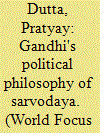

|
|
|
| 9 |
ID:
128290
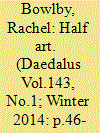

|
|
|
|
|
| Publication |
2014.
|
| Summary/Abstract |
In this piece. I look at an essay that l have probably read too often not to find in it the key to all matters
aesthetic, historical. philosophical, and more. The essay is Charles Baudelaire°s Le Peintre de la vie modeme (The Painter of Modern Life), first published in 1863 and written, most probably, around 1859 to 1860. Baudelaire's exhilarating innovation is to down- play the signi?cance of eternal value in art. in favor of what he designates as its other half, the ?eeting presentness that is modernity. My essay is unapologetically an appreciation - for the most part - of a text that, in focusing on another artist, itself appears to be just that.' For Baudelaire develops his arguments through a mock-anonymous celebration of the artist Constantine Guys, referred to as M. G. (Monsieur G.). Guys's proli?c sketches, done at speed, for rapid journal publication, chart the smallest of day-by- day changes and typical scenes in contemporary life. Guys's pictures - the art of modernity - give to the day a second life. and "translate" into a different medium - from sight to (mental) impression to its "rebirth" as a sketch - that which would otherwise be lost with its passing.
|
|
|
|
|
|
|
|
|
|
|
|
|
|
|
|
| 10 |
ID:
131421
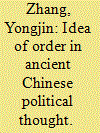

|
|
|
|
|
| Publication |
2014.
|
| Summary/Abstract |
Is there any significant International Thought in antiquity beyond the West? If there is, why has there as yet been no meaningful conversation between the expanding enterprise of theorizing International Relations (IR) today and ancient Chinese political thought? This extended version of my Martin Wight Memorial Lecture addresses these questions through a critical exploration of how a pivotal idea in ancient as well as contemporary international relations, namely, the idea of order, is deliberated in ancient Chinese political thought. Inspired by Martin Wight's profound scholarship so steeped in historical and philosophical depth, it investigates why and how alternative visions of moral, social and political order are imagined, offered and debated in ancient Chinese philosophical discourse. It examines the ways in which the moral and political pursuit of order as a social ideal is conducted in the anarchical society of states in ancient China. Through these historical and philosophical investigations, this article seeks to establish that ancient Chinese political and philosophical deliberations are rich in international thought and that classical thinkers in China's Axial Age are alive to us and contemporaneous with us philosophically as much as ancient Greek philosophers are. In establishing such a claim, the article calls for, and issues an invitation to, a conversation between the world of thought in ancient China and the theorization of IR as an intellectual ritual in search of a truly international theory.
|
|
|
|
|
|
|
|
|
|
|
|
|
|
|
|
| 11 |
ID:
128294
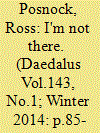

|
|
|
|
|
| Publication |
2014.
|
| Summary/Abstract |
Perhaps, like me. you have a propensity to collect books without quite knowing why. Over the years I have piled up books by and about, say, Ludwig Witt- genstein, Hannah Arendt, George Santayana, Philip Roth, Ad Reinhardt, Philip Guston, Franz Rosen- zweig, Penelope Fitzgerald, Thomas Bernhard - and not only not read them, but have no desire to do so. I have kept busy working on other things. And for a decade or two at a time. these texts simply gather dust on my shelves. But then, inevitably. I am drawn to these nearly forgotten volumes and. strangely, they prove pivotal to a new project: l recall. for instance, that Santayana ascended, literally, from the obscurity of a low shelf to earn a chapter in my book on William and Henry James. Wittgenstein made an analogous, if more circuitous, journey from the shadows, waiting untouched, until five years ago when I kept a long-held inner vow to read an- other languishing tome, one that had stared me down so often it had acquired an aura of intimidation: Stanley Cavell's The Claim of Reason: Wittgen-stein, Skeptirism, Morality and Tragedy. It was indeed intimidating. but also inspiring: that experience opened the door to more Cavell - and to deeper engagements with Emerson - and to Wittgenstein, who has joined the sage of Concord as a central ?gure in my current project on writers. artists. and philosophers who renounce their careers. The peculiarities of this manner of book buying - the absence of full consciousness and the long gap between acquisition and reading - puts me in mind
|
|
|
|
|
|
|
|
|
|
|
|
|
|
|
|
| 12 |
ID:
125231
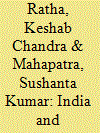

|
|
|
|
|
| Publication |
2013.
|
| Summary/Abstract |
India and Myanmar have been enjoying the mutual contact in the field of trade, commerce, religion, law, political philosophy and culture. The British Raj was making its control over two lands for years together. Myanmar got its independence and India was also freed from the shackles of British rule on 15th Aug, 1947. Nehru and U Nu developed a friendship that created the foundation of good Indo- Burmese relation. When India supported pro-democracy movement and criticized the ruling military Junta in Myanmar, the relation between two nations came down. However, in 1990s, the relation between two countries restored again. They are co-operating in all fields including countering insurgency on the border, checking narcotics smuggling across the border, sharing intelligence on a real-time basis, promoting trade and investment. There are four important factors such as cultural, political, economic and security that involve relations with Myanmar.
|
|
|
|
|
|
|
|
|
|
|
|
|
|
|
|
| 13 |
ID:
186781
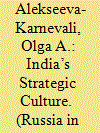

|
|
|
|
|
| Summary/Abstract |
India is emerging as a global power, but its strategic culture remains
largely understudied. Expert literature calls into question the very
existence of India’s own “systemic” strategic thinking. The article probes
into the validity of this viewpoint, postulates that India has its own
strategic culture, and highlights its key elements.
With the help of Michel Foucault’s genealogical method, the genealogy
of the concepts of ‘war’ and ‘power’ in Indian political philosophy is
examined and, on this basis, the central conceptual elements of India’s
military-political system are determined.
This approach shows that India’s strategic culture is distinguished not only
by its own systemic strategic thinking, but also by an original (different
from the Western one) way of structuring and coding the conceptual space
of ‘society,’ ‘politics,’ and ‘statehood.’ This gives an idea of how war and
strategy were understood in Indian culture in the past and how they are
seen today.
|
|
|
|
|
|
|
|
|
|
|
|
|
|
|
|
| 14 |
ID:
132374
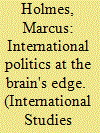

|
|
|
|
|
| Publication |
2014.
|
| Summary/Abstract |
Social neuroscience has seen a profound rise in other social science disciplines, such as economics, yet there has been relatively little systematic analysis of the usefulness of social neuroscience for international relations and the study of world politics. This article suggests that while there are many potential explanations for why this might be the case, one important barrier to adopting neuroscience may be our metaphysical assumptions and philosophical wagers. I suggest that if all politics is rooted in the brain, then two distinct arguments regarding agent-structure are plausible. One argument suggests that structure becomes redundant once the brain is accounted for; the other suggests that the brain simply drops out as epiphenomenal. After all, if all politics is reflected in the brain, then the brain itself is less interesting than the structure being reflected. These wagers ultimately relate to positions we take on the mind-body problem and well-known ideational-material divide. New research in neuroscience and philosophy of mind suggests that this binary distinction can be overcome, suggesting a new "via media" between ideas and material that may offer significant promise for both theory and practice.
|
|
|
|
|
|
|
|
|
|
|
|
|
|
|
|
| 15 |
ID:
137149
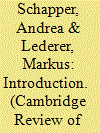

|
|
|
|
|
| Summary/Abstract |
This special issue contributes empirical analyses to the evolving research programme on human rights and climate change within international relations (IR) scholarship. We aim to supplement the existing normative debate within political philosophy and political theory on international, environmental and intergenerational justice (for example, Hiskes 2009; 2010; Woods 2010; Shue 2011; Arnold 2011) with empirical insights that regard human rights as a yardstick for climate-relevant action. We pay particular attention to institutionalization processes at the intersection of human rights and climate change.
|
|
|
|
|
|
|
|
|
|
|
|
|
|
|
|
| 16 |
ID:
142191
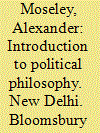

|
|
|
|
|
| Publication |
New Delhi, Bloomsbury Publishing India, 2016.
|
| Description |
202p.pbk
|
| Standard Number |
9789385436970
|
|
|
|
|
|
|
|
|
|
|
|
Copies: C:1/I:0,R:0,Q:0
Circulation
| Accession# | Call# | Current Location | Status | Policy | Location |
| 058397 | 320.01/MOS 058397 | Main | On Shelf | General | |
|
|
|
|
| 17 |
ID:
102128
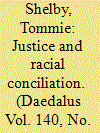

|
|
|
|
|
| Publication |
2011.
|
| Summary/Abstract |
As we attempt to measure racial progress in America today and chart a path toward further progress, we should look to the vision of Martin Luther King, Jr. Barack Obama has also offered an influential vision of race in America that is similar to and inspired by King's. This essay compares King's and Obama's respective visions for race relations in U.S. society. Both men profess a commitment to racial equality and integration as fundamental ideals; and both provide an astute analysis of the racial realities of his day. However, Shelby's comparison of their visions reveals moral deficiencies in Obama's political philosophy, particularly with regard to the proposed way forward and the worthy principles that would have to be compromised on by following his path. Liberal pragmatism in matters of race may yield some social benefits, but not without moral costs.
|
|
|
|
|
|
|
|
|
|
|
|
|
|
|
|
| 18 |
ID:
101845
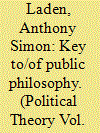

|
|
|
|
|
| Publication |
2011.
|
| Summary/Abstract |
What I would like to do in these brief remarks is offer a characterization of
what James Tully calls public philosophy, in part by situating it amongst other
more familiar positions in contemporary political philosophy, but also in part
by suggesting how once we grasp what is distinctive about this approach, it
can help us see that familiar terrain anew. To keep to Tully's musical metaphor, this will be an exercise in amplifying the bass line, the ostinato, in order
to make it easier for the rest of us to join Tully in his new key. With limited
space, what I say will be more suggestive and sketchy than I would like. It will
amount to humming a few bars in the hope that others can take up the tune. Or,
to use one of Tully's favorite images from Wittgenstein, to count 2, 4, 6, in the
hopes that you will know how to go on.
Let me start with a very crude map of three trends in contemporary political philosophy
|
|
|
|
|
|
|
|
|
|
|
|
|
|
|
|
| 19 |
ID:
175448
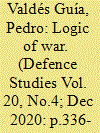

|
|
|
|
|
| Summary/Abstract |
At the origin of every war is an existential conflict and a recourse to violence that opens the “ontic” door of the enemy to transform him. Judgement corresponds to political logic, and violent existential transformation to the logic of war, which is engendered in that political matrix throughout the duration of hostilities. The objective nature of that logic structures the rationale of the theatre in terms of “performative” praxis, with two inseparable aspects: a violence that while destroying one order imposes an alternative one. The subjective nature of that logic is generated in its political matrix throughout the duration of the conflict, determining, in a dynamic way, its most basic formalization. Since war is engendered in politics, it adopts its character, a subjective nature that leads it to seek a peace treaty or a victory. In short, when the war begins, the political totality of each one of the belligerents starts to incorporate a new situation and, therefore, two logics coexist: one engendered in the other, and both conditioning each other. The symbiotic relationship between these two rationalities does not allow politics to dominate it according to the parameters of an instrumental reason.
|
|
|
|
|
|
|
|
|
|
|
|
|
|
|
|
| 20 |
ID:
128295
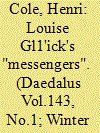

|
|
|
|
|
| Publication |
2014.
|
| Summary/Abstract |
You have only to wait, they will find you. The geese ?ying low over the marsh, glittering in black water. They find you. And the deer - how beautiful they are. as though their bodies did not impede them. Slowly they drift into the open through bronze panels of sunlight. Why would they stand so still if they were not waiting? Almost motionless, until their cages rust, the shrubs shiver in the wind. squat and lea?ess. You have only to let it happen: that cry - release, release - like the moon wrenched out of earth and rising full in its circle of arrows until they come before you like dead things. saddled with ?esh. and you above them. wounded and dominant.
|
|
|
|
|
|
|
|
|
|
|
|
|
|
|
|
|
|
|
|
|